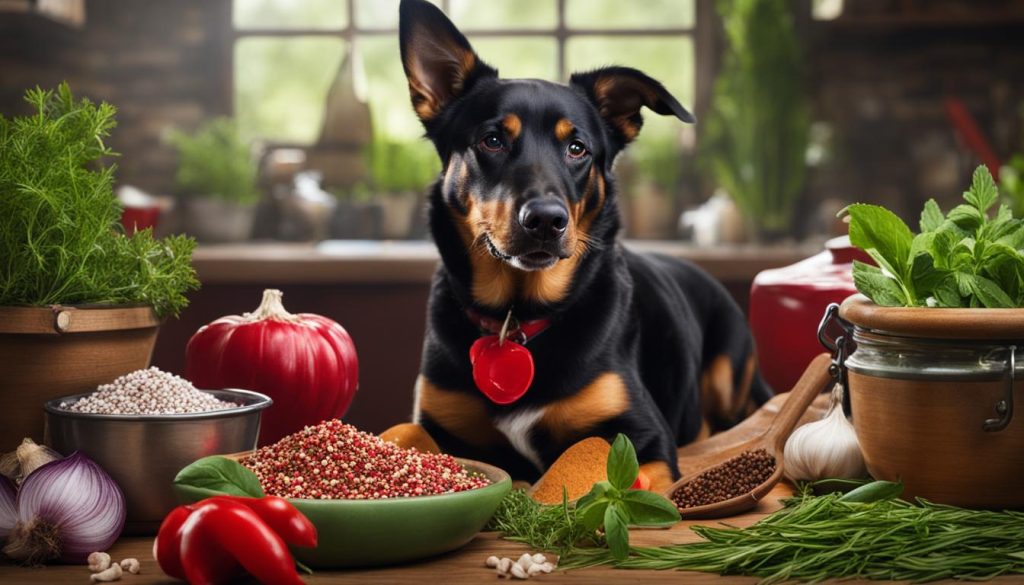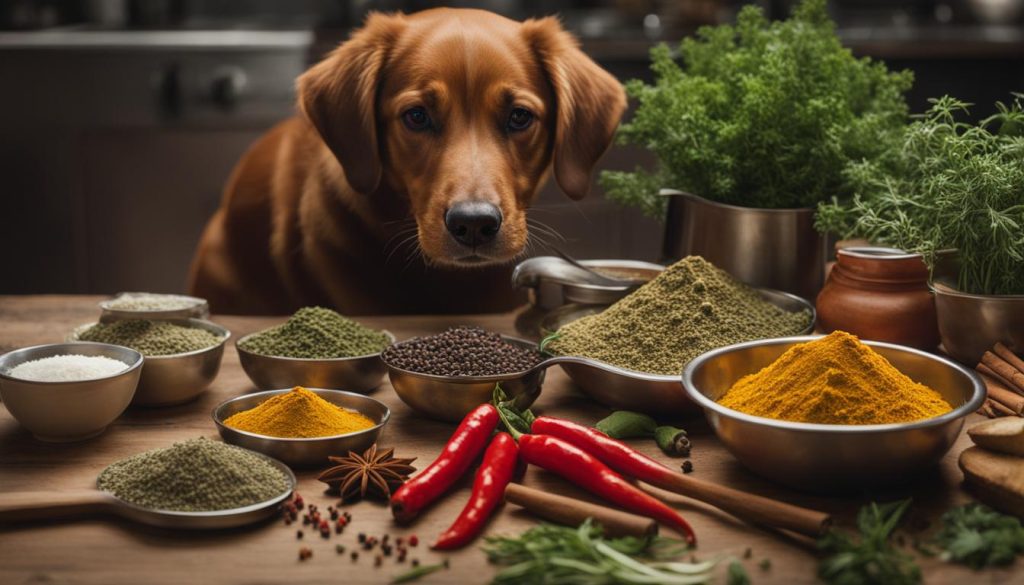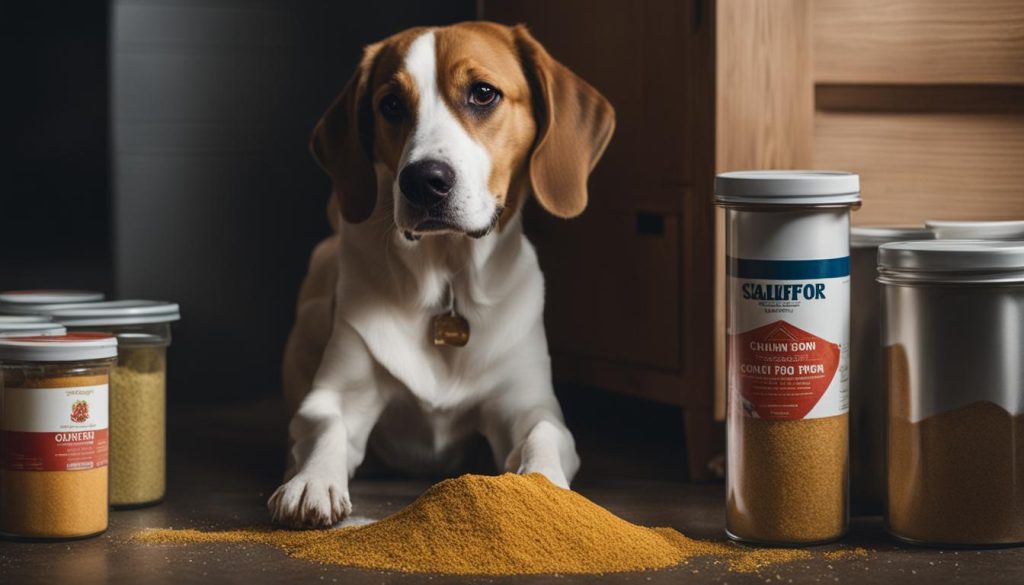As a responsible dog owner, I often wonder what seasonings are safe to include in my furry friend’s diet. Just like humans, dogs can benefit from the various flavors and health properties of herbs and spices. However, it’s crucial to know which ones are safe and which ones should be avoided to ensure their well-being.
Before incorporating any seasonings into your dog’s meals, it’s always recommended to consult with a veterinarian. While there is limited research on the use of herbs and spices with pets, a veterinarian’s guidance can help you make informed decisions and prevent any potential harm.
Key Takeaways:
- Consult with a veterinarian before adding any seasonings to your dog’s diet.
- Choose products that have been tested by a third party for quality assurance.
- Avoid toxic seasonings such as garlic, onion, and cocoa.
- Safe seasonings for dogs include basil, rosemary, and turmeric.
- Always start with small amounts and monitor your dog for any adverse reactions.
The Difference Between Herbs and Spices
When it comes to cooking, herbs and spices play a crucial role in adding flavor and depth to dishes. But have you ever wondered what sets herbs apart from spices? Understanding the difference between the two can enhance your culinary knowledge and help you make informed decisions when seasoning your meals.
Herbs are derived from the leaves of plants and are typically used fresh or dried. Common examples include basil, oregano, rosemary, and thyme. They add a burst of freshness and aroma to dishes and are often associated with Mediterranean and Italian cuisines.
Spices, on the other hand, come from various parts of plants such as roots, flowers, stems, fruits, bark, and seeds. Examples of spices include cinnamon, cumin, paprika, and turmeric. Spices tend to have stronger and more intense flavors compared to herbs, and they are often used in smaller quantities.
| Herbs | Spices |
|---|---|
| Basil | Cinnamon |
| Oregano | Cumin |
| Rosemary | Paprika |
| Thyme | Turmeric |
Knowing the difference between herbs and spices allows you to make more informed choices when it comes to flavoring your dishes. Whether you’re adding a sprinkle of dried oregano to your pasta sauce or a pinch of cinnamon to your morning coffee, understanding the unique qualities of each can elevate your culinary creations.

“Herbs are derived from the leaves of plants, while spices come from various parts such as roots, flowers, stems, fruits, bark, and seeds.”
Herbs and Spices to Avoid for Dogs
When it comes to seasoning your dog’s meals, it’s crucial to be aware of the herbs and spices that can be harmful to their health. Some common seasonings to avoid giving to your furry friend include:
- Allspice
- Bay leaf
- Cayenne
- Cocoa or cocoa powder
- Chives
- Cloves
- Curry
- Garlic
- Hops
- Marjoram
These seasonings, among others, can have adverse effects on dogs and may cause gastrointestinal upset, organ damage, or toxic reactions. It’s important to check the ingredients of any food or treats you give your dog to ensure they do not contain any of these harmful seasonings.
If you suspect that your dog has consumed any unsafe seasonings, it’s crucial to contact your veterinarian immediately for guidance. They can provide advice on how to handle the situation based on the specific seasoning ingested and the symptoms your dog is experiencing. Remember, it’s always better to seek professional help to ensure your dog’s safety and well-being.
| Toxic Seasonings for Dogs |
|---|
| Allspice |
| Bay leaf |
| Cayenne |
| Cocoa or cocoa powder |
| Chives |
| Cloves |
| Curry |
| Garlic |
| Hops |
| Marjoram |

Please be aware that this list is not exhaustive, and there may be other seasonings that can be harmful to dogs. Always consult with your veterinarian if you have any concerns or questions about specific herbs and spices.
Safe Herbs and Spices for Dogs
When it comes to adding flavor and variety to your dog’s meals, there are several herbs and spices that are safe and can provide health benefits. These dog-approved seasonings can be incorporated into their diet in small amounts to enhance the taste and provide additional nutrients. Here are some safe herbs and spices to consider:
- Anise Seeds: Anise seeds have a licorice-like flavor and can help with digestion and upset stomach.
- Basil: Basil adds a fresh and aromatic taste to meals and contains antioxidants that promote overall health.
- Chamomile: Chamomile has calming properties and can help soothe an anxious or stressed dog.
- Cilantro: Cilantro provides a burst of flavor and is rich in vitamins and antioxidants.
- Cinnamon: Cinnamon is a warm and fragrant spice that can help regulate blood sugar levels and has anti-inflammatory properties.
- Dandelion: Dandelion is known for its detoxifying properties and can support liver and kidney health.
- Dill: Dill has a unique flavor and can help with digestion and bad breath.
- Fennel: Fennel has a mild licorice taste and can aid in digestion and relieve gas in dogs.
- Ginger: Ginger is well-known for its anti-inflammatory properties and can help with nausea and motion sickness.
- Milk Thistle: Milk thistle is a powerful herb that supports liver health and promotes detoxification.
- Rosemary: Rosemary adds a savory flavor to meals and has antioxidant properties.
- Sage: Sage has a strong aroma and can aid in digestion and help soothe an upset stomach.
- Thyme: Thyme has a fragrant and earthy taste and is known for its antimicrobial properties.
- Turmeric: Turmeric has anti-inflammatory properties and can support joint health and reduce inflammation.
Remember to start with small amounts of these herbs and spices and monitor your dog for any adverse reactions. Each dog is unique, so it’s important to consult with a veterinarian before introducing any new seasonings to their diet. By using these safe herbs and spices in moderation, you can add variety to your dog’s meals while promoting their overall health and well-being.
Table: Safe Herbs and Spices for Dogs
| Seasoning | Health Benefits |
|---|---|
| Anise Seeds | Aids digestion and relieves upset stomach |
| Basil | Contains antioxidants for overall health |
| Chamomile | Calming properties for anxiety and stress relief |
| Cilantro | Rich in vitamins and antioxidants |
| Cinnamon | Regulates blood sugar levels and reduces inflammation |
| Dandelion | Detoxifies and supports liver and kidney health |
| Dill | Aids digestion and freshens breath |
| Fennel | Relieves gas and aids digestion |
| Ginger | Anti-inflammatory properties and helps with nausea |
| Milk Thistle | Supports liver health and detoxification |
| Rosemary | Antioxidant properties and adds savory flavor |
| Sage | Aids digestion and soothes upset stomach |
| Thyme | Antimicrobial properties and fragrant taste |
| Turmeric | Anti-inflammatory and supports joint health |
Always remember to introduce new herbs and spices gradually and observe your dog’s reaction. If you notice any adverse effects, discontinue use and consult with your veterinarian. With proper research and guidance, you can safely incorporate these herbs and spices into your dog’s diet to enhance their meals and promote their overall well-being.

Precautions for Using Herbs and Spices with Dogs
Before incorporating herbs and spices into your dog’s diet, it is crucial to take some precautions to ensure their safety and well-being. Here are a few important guidelines to follow:
- Consult with a veterinarian: It is always recommended to consult with a veterinarian before adding any seasonings to your dog’s meals. They can provide valuable insights based on your dog’s specific health needs and any potential interactions or allergies to certain herbs and spices.
- Start with small amounts: When introducing a new seasoning to your dog’s diet, start with a small amount to see how they react. This will help you determine if they have any adverse reactions or sensitivities to the specific herb or spice.
- Monitor for adverse reactions: Keep a close eye on your dog after incorporating a new seasoning into their meals. Watch for any signs of gastrointestinal upset, allergic reactions, or changes in behavior. If you notice any negative effects, discontinue the use of that seasoning and consult with your veterinarian.
- Choose quality products: When using manufactured supplements or seasonings, ensure they have been tested by a third party for quality assurance. This can help guarantee that the products are safe and free from contaminants.
Always remember that every dog is unique, and what may be safe for one dog may not be suitable for another. It’s important to consider your dog’s individual health needs and consult with a professional before making any changes to their diet.
Table: Common Herbs and Spices that Can Be Harmful to Dogs
| Herb/Spice | Potential Toxic Effects |
|---|---|
| Allspice | Gastrointestinal upset |
| Bay Leaf | Respiratory distress, gastrointestinal upset |
| Cocoa or Cocoa Powder | Chocolate toxicity, neurological issues |
| Garlic | Anemia, gastrointestinal upset |
| Onion | Anemia, gastrointestinal upset |
| Mustard Seed or Powder | Gastrointestinal upset, respiratory distress |
Remember, this is not an exhaustive list, and there may be other herbs and spices that can be harmful to dogs. Always do thorough research and consult with a veterinarian to determine the safety of specific seasonings for your furry friend.

By following these precautions and guidelines, you can ensure that your dog can safely enjoy the benefits of herbs and spices without any negative effects on their health.
What To Do If Your Dog Eats Unsafe Seasonings
If you suspect that your dog has ingested any unsafe seasonings, it is crucial to act quickly and take the necessary steps to ensure their safety and well-being. Here are some important measures to follow:
- Contact a veterinarian: Reach out to your veterinarian as soon as possible for professional advice. They will be able to guide you based on the specific seasoning ingested and the symptoms your dog is experiencing.
- Emergency hospital or pet poison hotline: If you are unable to reach your regular veterinarian or if the situation seems urgent, consider contacting an emergency animal hospital or a pet poison helpline for immediate assistance.
- Provide information: When seeking help, provide accurate information about the seasoning your dog has consumed, including the quantity and any packaging details if available. This will help determine the level of toxicity and guide the appropriate treatment.
- Follow professional guidance: Follow the advice and instructions given by the veterinarian, emergency hospital, or pet poison hotline. They may recommend inducing vomiting, administering activated charcoal, or other interventions to mitigate the effects of the unsafe seasoning.
- Monitor your dog: Keep a close eye on your dog’s behavior, appetite, and overall well-being after the incident. If you notice any concerning symptoms or changes, contact your veterinarian for further guidance.
Remember, it is always better to seek professional help when your dog ingests toxic seasonings, as they can cause significant harm if not properly addressed. Taking immediate action can greatly increase the chances of a positive outcome for your beloved furry friend.

Table: Common Symptoms of Toxic Seasoning Ingestion
| Symptoms | Description |
|---|---|
| Gastrointestinal upset | Vomiting, diarrhea, abdominal pain |
| Weakness and lethargy | Lack of energy, decreased responsiveness |
| Difficulty breathing | Labored breathing, coughing, wheezing |
| Increased heart rate | Rapid pulse, abnormal heart rhythm |
| Seizures | Involuntary muscle contractions, loss of consciousness |
| Organ damage | Impaired liver or kidney function, jaundice |
“Acting swiftly and seeking professional guidance is crucial when your dog ingests unsafe seasonings. Don’t hesitate to contact a veterinarian or an emergency animal hospital to ensure your dog’s safety and prevent any potential complications.” – Dr. Amanda Thompson, DVM
Wrapping Up
In conclusion, when it comes to seasoning your dog’s meals, it’s crucial to prioritize their safety and well-being. While there are many herbs and spices that can offer health benefits, there are also those that can be toxic to dogs. Always consult with a veterinarian before introducing any seasonings into your dog’s diet. They can provide you with personalized guidance based on your dog’s specific needs.
Remember to avoid seasonings such as onion, garlic, and nutmeg, as they can be harmful to dogs. Instead, opt for safe options like basil, rosemary, and ginger, which can not only add flavor to your dog’s meals but also provide various health benefits. Start with small amounts and monitor your dog for any adverse reactions.
When using manufactured supplements containing herbs and spices, look for products that have been tested by a third party for quality assurance. This ensures that you’re providing your dog with safe and trustworthy supplements. It’s essential to follow all precautions and directions given by your veterinarian to ensure the best outcome for your furry friend.
By following these guidelines and relying on professional advice, you can safely enhance your dog’s meals with herbs and spices, providing them with a flavorful and nutritious diet.
FAQ
What seasonings can dogs have?
Many herbs and spices can provide benefits to dogs, but it’s important to know which ones are safe. Consult with a veterinarian before adding any seasonings to your dog’s diet.
What is the difference between herbs and spices?
Herbs come from the leaves of plants, while spices come from other parts such as the roots, flowers, stems, fruits, bark, and seeds.
What herbs and spices should be avoided for dogs?
Some common seasonings to avoid include allspice, bay leaf, cayenne, cocoa or cocoa powder, chives, cloves, curry, garlic, hops, marjoram, mustard seed or powder, nutmeg, onion, oregano, paprika, pumpkin pie spice, salt, Spanish thyme. These seasonings can be toxic to dogs.
What are safe herbs and spices for dogs?
Safe seasonings for dogs include anise seeds, basil, chamomile, cilantro, cinnamon, dandelion, dill, fennel, ginger, milk thistle, rosemary, sage, thyme, turmeric. These seasonings can provide health benefits for dogs.
How can herbs and spices be used in dog treat recipes?
Herbs and spices such as basil, rosemary, cinnamon, ginger, and turmeric can be incorporated into homemade dog treats to add flavor and nutrients.
What precautions should be taken when using herbs and spices with dogs?
Always consult with a veterinarian before adding any herbs or spices to your dog’s diet. Follow their recommendations and monitor your dog for any adverse reactions.
What should I do if my dog eats unsafe seasonings?
If you suspect your dog has ingested any unsafe seasonings, contact a veterinarian, an emergency hospital, or a pet poison hotline for guidance.
What is the conclusion?
While there are many herbs and spices that can benefit dogs, it is crucial to know which ones are safe and which ones should be avoided. Always consult with a veterinarian and follow their recommendations for adding seasonings to your dog’s diet.






